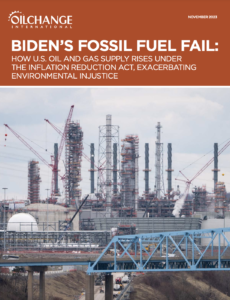
Published by Oil Change International
November 2023
A new report, “Biden’s Fossil Fuel Fail: How U.S. Oil and Gas Supply Rises under the Inflation Reduction Act, Exacerbating Environmental Injustice,” analyzes how the United States’ Inflation Reduction Act (IRA) fails to reduce fossil fuel production or alleviate impact on environmental justice communities. The analysis utilizes the Rhodium Group’s Climate Deck model, recently updated to incorporate the projected impacts of the Inflation Reduction Act, U.S. President Joe Biden’s signature “climate law”.
Rather than set the United States on a path toward a managed phase-out of fossil fuels, the Inflation Reduction Act and the Biden administration’s policies are set to lead to a significant increase in U.S. oil and gas extraction and soaring exports.
This finding makes a mockery of President Joe Biden’s claims of “climate leadership” and signals that without additional action to constrain oil and gas production, the suffering of oil and gas frontline communities will only grow. Black, Brown, Indigenous, and poor communities, especially in Appalachia, the Gulf Coast, and the Permian Basin, are disproportionately impacted by fossil fuel pollution, climate disasters, and health impacts.
Key findings include:
- U.S. oil and gas production will continue to grow despite the IRA’s support for clean energy, with oil production rising 13% by 2035 while gas production rises 7%. This happens even while the Climate Deck model projects a modest decline in domestic demand for oil and gas.
- Gas exports are projected to nearly double by 2035, while oil and petroleum product exports will rise 23%. The decline in domestic gas demand is tempered by an increase in gas consumption within the oil and gas industry, with gas consumption by energy-hungry LNG export plants growing by 140%.
- Biden’s energy policies and the Inflation Reduction Act could fall well short of U.S. climate goals of reducing emissions by 50-52% below 2005 levels by 2030, with an estimated 16-18 percentage point gap that would need to be filled with additional policies to ensure faster emissions decline this decade and beyond.
- Growth in U.S. oil and gas production and exports will exacerbate the suffering of communities on the frontlines of this fossil fuel expansion, which are disproportionately borne by Black, Brown, Indigenous, and poor communities in Appalachia, the Gulf of Mexico, and the Permian Basin of Texas and New Mexico.
Despite these concerning findings, there is still time for President Biden to change course and catalyze a swift and equitable phase-out of fossil fuel production, processing and exports.
Key recommendations to protect communities and the climate:


End fossil finance
End fossil fuel leasing on public lands
End permitting of all new fossil fuel infrastructure
Phase out exports of oil, gas, and products derived from them
KEEP IT IN THE GROUND!
WE DEMAND CLEAN ENERGY, A CLEAN ENVIRONMENT, CHEMICAL FREE NOURISHING FOOD, AND CLEAN WATER AND AIR NOW!!!!!!!!!!!!!!!!!!!!!!!